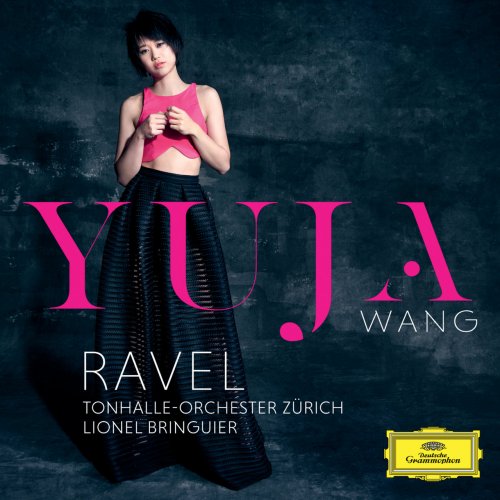
Yuja Wang - Ravel: Piano Concertos, Faure: Ballade, Op. 19 (2015)
BAND/ARTIST: Yuja Wang
- Title: Ravel: Piano Concertos, Faure: Ballade, Op. 19
- Year Of Release: 2015
- Label: Deutsche Grammophon
- Genre: Classical
- Quality: FLAC (tracks) / MP3 320 Kbps
- Total Time: 50:09
- Total Size: 204 Mb / 133 Mb
- WebSite: Album Preview
Tracklist:
Piano Concerto in G Major, M. 83 (Maurice Ravel)
1. 1. Allegramente 08:19
2. 2. Adagio assai 08:19
3. 3. Presto 03:59
4. Fauré: Ballade In F Sharp, Op.19 12:05
Piano Concerto For The Left Hand In D, M. 82 (Maurice Ravel)
5. 1. Lento 07:41
6. 2. Allegro 04:51
7. 3. Tempo I 04:55
Performers:
Yuja Wang (piano)
Tonhalle-Orchester Zürich
Lionel Bringuier
Piano Concerto in G Major, M. 83 (Maurice Ravel)
1. 1. Allegramente 08:19
2. 2. Adagio assai 08:19
3. 3. Presto 03:59
4. Fauré: Ballade In F Sharp, Op.19 12:05
Piano Concerto For The Left Hand In D, M. 82 (Maurice Ravel)
5. 1. Lento 07:41
6. 2. Allegro 04:51
7. 3. Tempo I 04:55
Performers:
Yuja Wang (piano)
Tonhalle-Orchester Zürich
Lionel Bringuier
Will we ever get to the point where young female artists can get beyond sexploitation album covers and simply be artists? Yuja Wang (I refuse to accept the album’s evident invitation simply to call her “Yuja”) has technique to burn, and it’s entirely appropriate that she plays all of this music with a youthful energy well-suited to her years, and in firm opposition to the dainty Asian sex-kitten persona her promoters at Universal appear determined to project.
Ravel’s Concerto in G major seems to have replaced Saint-Saëns’ Second as “world’s most popular French piano concerto,” and Wang plays it deftly, unsentimentally, and with plenty of the necessary clarity and poise. It’s particularly refreshing to hear her convincing rubato and refusal to slam on the brakes in the first movement’s initial solo episode, as well as her fleet, direct, but dynamically sensitive reading of the central Adagio assai–no affected profundity here! And despite the generally quick tempos, Wang takes the trouble to articulate the finale’s toccata-like textures with crystalline precision.
Wang plays the Concerto for the Left Hand with similar confidence and directness, offering a particularly splendid concluding cadenza, although I was less impressed by conductor Lionel Bringuier’s contribution. He’s on basically the same wavelength as Wang, only with less flair. His refusal to characterize that “dirty”, flutter- tonguing jazz episode in the G major concerto’s first-movement recapitulation served as due warning that the Left Hand’s opening contrabassoon solo might lack the focus it requires (it does have the melody, after all), and that the transition to the central march episode would be unduly rushed. Still, nothing he does gets in the way of Wang’s uninhibited virtuosity, and that’s what ultimately matters.
The Fauré coupling recalls a similar release from Alicia de Larrocha on Decca, only Wang’s illustrious predecessor chose the Fantasie for piano and orchestra, arguably a more apt selection. Still, few will take issue with this lovely reading of the Ballade for solo piano. Wang captures the music’s flow in a work where subtlety of the rhythm and the ability to spin out those long, seamless lines of melody count for everything. In sum, this is unquestionably a fine release from an artist who sounds completely comfortable in shoes which are tastefully concealed by her floor-length peekaboo skirt, even if her midriff is not.
Ravel’s Concerto in G major seems to have replaced Saint-Saëns’ Second as “world’s most popular French piano concerto,” and Wang plays it deftly, unsentimentally, and with plenty of the necessary clarity and poise. It’s particularly refreshing to hear her convincing rubato and refusal to slam on the brakes in the first movement’s initial solo episode, as well as her fleet, direct, but dynamically sensitive reading of the central Adagio assai–no affected profundity here! And despite the generally quick tempos, Wang takes the trouble to articulate the finale’s toccata-like textures with crystalline precision.
Wang plays the Concerto for the Left Hand with similar confidence and directness, offering a particularly splendid concluding cadenza, although I was less impressed by conductor Lionel Bringuier’s contribution. He’s on basically the same wavelength as Wang, only with less flair. His refusal to characterize that “dirty”, flutter- tonguing jazz episode in the G major concerto’s first-movement recapitulation served as due warning that the Left Hand’s opening contrabassoon solo might lack the focus it requires (it does have the melody, after all), and that the transition to the central march episode would be unduly rushed. Still, nothing he does gets in the way of Wang’s uninhibited virtuosity, and that’s what ultimately matters.
The Fauré coupling recalls a similar release from Alicia de Larrocha on Decca, only Wang’s illustrious predecessor chose the Fantasie for piano and orchestra, arguably a more apt selection. Still, few will take issue with this lovely reading of the Ballade for solo piano. Wang captures the music’s flow in a work where subtlety of the rhythm and the ability to spin out those long, seamless lines of melody count for everything. In sum, this is unquestionably a fine release from an artist who sounds completely comfortable in shoes which are tastefully concealed by her floor-length peekaboo skirt, even if her midriff is not.
Classical | FLAC / APE | Mp3
As a ISRA.CLOUD's PREMIUM member you will have the following benefits:
- Unlimited high speed downloads
- Download directly without waiting time
- Unlimited parallel downloads
- Support for download accelerators
- No advertising
- Resume broken downloads


